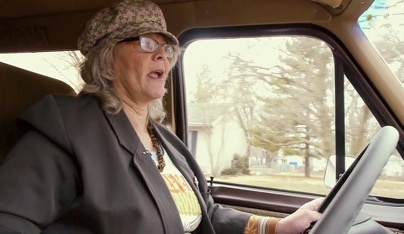More than two years after she applied to the city government in Bloomington, Illinois for a license to operate a late-night van service, Julie Crowe finally will be allowed to start her business, thanks to a court decision upholding her right to earn a living.
In Bloomington, “vehicles for hire” take college students from their dorms to downtown bars and back on weekend evenings. Crowe previously worked as a driver for other vehicle-for-hire companies and saw a lot of room for improvement in the market, which has been dominated by “party buses” on which overcrowding, fights, and vomiting are the norm. Crowe was troubled by these unpleasant and unsafe conditions, and also by the existing services’ practice of using group drop-off points, which force passengers to make the last part of their trip home on foot.
“It didn’t seem right to make inebriated young women in skimpy little outfits walk four blocks,” she says. Crowe decided to offer something better: a 15-passenger van that would provide door-to-door service.
But the city—and its established taxi and vehicle-for-hire operators—stood in her way.
Owners Object to Competition
After Crowe applied for a license to operate her business in May 2011, a local law required the city to hold a hearing. Owners of existing vehicle services were invited to comment on whether a newcomer should be allowed to enter the field. At Crowe’s hearing, her would-be competitors predictably claimed, without evidence, that the city didn’t need any new competition because there already were “enough” vehicles licensed.
That same law allowed the deputy city manager to deny a vehicle-for-hire application if she didn’t find an additional business “desirable”—which meant that she could deny any application for any reason at all. In Crowe’s case, she took the established operators’ word for it that no competition was needed and denied the application.
Crowe appealed the denial to the City Council, but the deck was stacked against her there, too. Council members received a “record” that contained only evidence supporting the city’s decision, and none of the evidence that showed why Crowe’s business would be beneficial.
Center Raises Constitutional Questions
Then the Liberty Justice Center, the public interest litigation center of the Illinois Policy Institute, got involved. We brought a lawsuit on Crowe’s behalf challenging Bloomington’s licensing ordinance as a violation of her constitutional due process rights. We argued the ordinance had no legitimate purpose because it served only the private interests of established vehicle-for-hire owners. We also argued the provision allowing the deputy city manager to deny an application when she didn’t find a service “desirable” was unconstitutionally vague and arbitrary.
The court agreed. In August, Judge Rebecca Foley of the McLean County Circuit Court struck down Bloomington’s ordinance for both of those reasons. That means Crowe can at last start her business and soon will be serving customers every weekend in Bloomington—as she should have been allowed to do from the start. Crowe says looks forward not only to running her new business, but also to seeing the improved service others will offer in response to the added competition.
“I hope my presence out there will make others step up their game,” she says.
Similar Laws Remain
Although Bloomington’s ordinance has been struck down, protectionist taxi and vehicle-for-hire licensing laws remain all too common across Illinois and the country.
Crowe says she hopes her court victory “will create an avenue for other people who want to start their own businesses instead of just working for the established players.”
Indeed, the decision should send a message to local governments across Illinois and the nation that they cannot deny an individual’s right to earn a living to protect politically privileged businesses from competition or based on a bureaucrat’s whim. It should also encourage other entrepreneurs to challenge similar laws in their own cities so that protectionist regulations can become a thing of the past not only in Bloomington but everywhere.
Jacob Huebert ([email protected] ) is associate counsel at Liberty Justice Center, a public interest litigation center of the Illinois Policy Institute.




